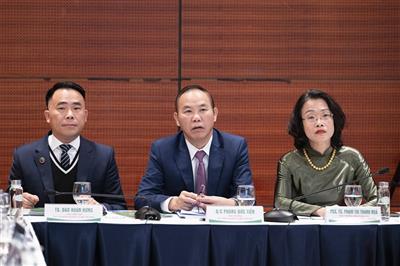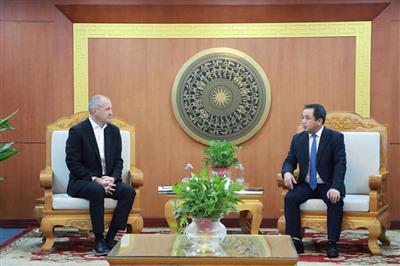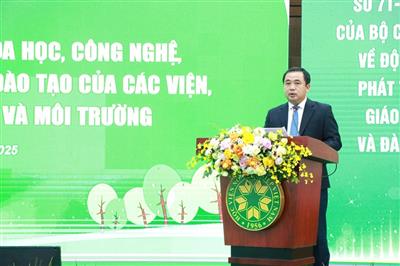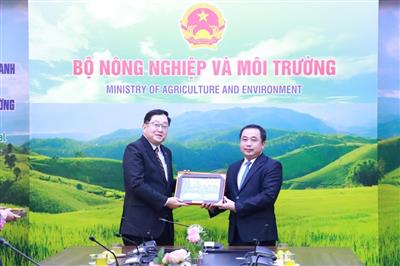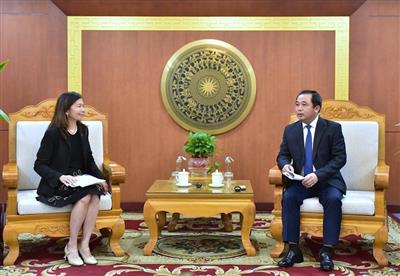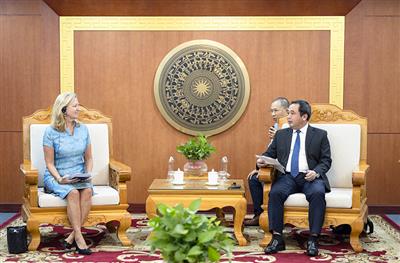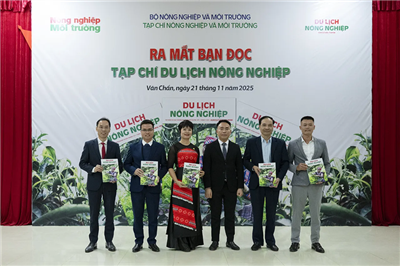
Media training workshop on integration, UNESCO, and ASEAN in 2024
26/04/2024TN&MTOn April 25th, the Ministry of Information and Communications (MIC) hosted a training workshop on media coverage of integration, UNESCO, and ASEAN in 2024 for journalists from various media agencies in Hanoi.

Director of the MIC's Department of International Cooperation, Trieu Minh Long, delivered a speech at the workshop
In his opening speech at the conference, Director of the MIC's Department of International Cooperation, Trieu Minh Long, emphasized the objective of the conference: to provide information and enrich propaganda content across media platforms, particularly concerning Vietnam's participation, contribution, and integration. He also underscored the important role of press agencies in enhancing public understanding of integration, UNESCO, and ASEAN. Mr. Trieu Minh Long also shared the success of the ASEAN Information Ministers' Meeting held in Da Nang in September 2023, during which many new directions in ASEAN communication were proposed and discussed.
Among these directions, Mr. Trieu Minh Long emphasized three key points: first, the establishment of a vision for communication work by 2035; second, the crucial role of the press and media in modern society; and third, efforts to combat misinformation and fake news. Mr. Trieu Minh Long also shared Vietnam's leadership role in proposing solutions to combat fake news in the region, as well as plans for continued cooperation in 2024.

Deputy Director-General of the ASEAN Department (under the Ministry of Foreign Affairs of Vietnam), Trinh Minh Manh, answered the questions of reporters
During the discussion on "ASEAN cooperation and Vietnam's role”, Deputy Diretor-General of ASEAN Department (under the Ministry of Foreign Affairs of Viet. Nam), Trinh Minh Manh, presented ASEAN's role in promoting peace and stability in the region and globally, amidst the current world challenges. The representative from the Ministry of Foreign Affairs emphasized that ASEAN's value, established and developed over more than half a century, includes unity, diversity, cooperation, and dialogue, as well as its central role. Despite emerging geopolitical challenges such as the Russia-Ukraine conflict and situations in the Middle East and Africa, ASEAN maintains peace and stability amid diversity, cooperation, and development, attracting global partners like China, Australia, the United States, India, South Korea... Vietnam has actively played a positive role in ASEAN since joining the block, particularly in matters concerning peace, stability, and ASEAN's common interests by proposing initiatives and policies in areas such as free trade, regional peace, and stability, thereby motivating other member states to deepen integration and enhance cooperation. Furthermore, Vietnam’s “bamboo diplomacy” has inspired ASEAN to maintain independence, autonomy, and diversified cooperation.

Deputy Director-General of the Policy Planning Department (under the Ministry of Foreign Affairs), Vu Duy Thanh, addressed at the conference
Regarding foreign affairs, Deputy Director General of Policy Planning Department (under the Ministry of Foreign Affairs), Vu Duy Thanh, observed that the current global situation is evolving towards multipolarity and multilateralism at a faster pace than ever before, accompanied by various destabilizing factors. Among these, the impact of non-traditional security is prominent. According to Mr. Vu Duy Thanh, non-traditional security challenges have never been as severe as they are today, directly affecting socio-economic stability and, consequently, national political stability. Specifically, if climate change is not adequately addressed, the resulting damage could amount to $3 trillion USD globally. For Vietnam alone, the consequences of climate change could account for up to 1.5% of GDP.
Presentation on the direction of foreign affairs work in 2024 of the Vietnam National Commission for UNESCO and the priorities of the sub-committees, as mentioned by Mr. Dao Quyen Truong, Deputy Director-General of the Department of Cultural Diplomacy and UNESCO Affairs: Vietnam will continue to enhance its role in five important mechanisms of UNESCO, aiming to expand cooperation with the UNESCO Secretariat, UNESCO offices in Hanoi and the region, as well as with the National Commissions of member countries in the region. Simultaneously, the Vietnam National Commission for UNESCO pays attention to the new trends of cooperation and policies of countries within UNESCO to propose policies and strategies to the Government. We will also adjust legal normative documents in the fields of education, culture, science, information, and communication.

Mr. Dao Quyen Truong, Deputy Director-General of the Department of Cultural Diplomacy and UNESCO Affairs
During the process of integration into UNESCO, Vietnam has signed cooperation agreements, including the third agreement for the period 2021-2025, focusing on education, science, technology, natural sciences, culture, and information. In particular, in the field of natural sciences, Vietnam has received numerous titles from UNESCO, including 11 biosphere reserves and 3 areas designated as Global Geoparks. Vietnam is expected to establish an additional Geopark in Lang Son. Currently, UNESCO experts and delegations are conducting surveys and evaluations, and they will consider this issue in the coming year.
According to Mr. Dao Quyen Truong, Cao Bang province has been selected by UNESCO as the venue for the Asia-Pacific Geoparks Network International Conference in September 2024. It is anticipated that the conference will host over 1,000 delegates from various countries.

Mr. Le Ngoc Thao, the Head of Secretariat at the Management Board of the Cu Lao Cham – Hoi An Biosphere Reserve, attended online
In regards to the conservation of the Cu Lao Cham - Hoi An World Biosphere Reserve, which is intertwined with environmental protection and sustainable development, Mr. Le Ngoc Thao, the Head of Secretariat at the Management Board of the Cu Lao Cham – Hoi An Biosphere Reserve, noted that the biosphere reserve currently faces numerous challenges. These challenges include pollution from the mainland, sedimentation, salinization, coastal erosion, and natural disasters… To effectively access and operate the biosphere reserve, Mr. Le Ngoc Thao emphasized the necessity for local communities to take ownership of the biosphere reserve's narrative. He stressed the importance of exploiting resources in a civilized manner, without disrupting the natural structure of ecosystems and habitats. Additionally, he highlighted the significance of sharing benefits and applying the "4 houses" cooperation model within the biosphere reserve. As an example, Mr. Thao provided insight into the Conservation and Management Zone of Bai Huong village – a pioneering model in the country. Under this model, the state allocates a portion (19.01 hectares) of the water area of the conservation zone to the community of Bai Huong village for self-management and the exploitation of tourism services.
In the discussion segment of the conference, speakers addressed inquiries from journalists regarding Vietnam's foreign policy, Cambodia's proposal for the Phu Nam - Techo Canal Project, achievements in building the ASEAN community, the role and position of ASEAN in the global landscape, and its relations with external partners.
At the conclusion of the conference, Mr. Trieu Minh Long expressed hope that the training program had provided sufficient useful information for journalists to enhance their basic knowledge. He hoped this would enable them to write high-quality articles and delve deeper into the issues at hand.
Ngoc Huyen


